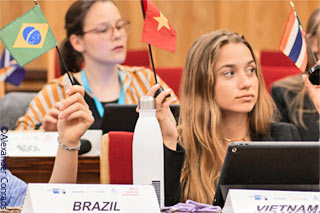How do the UN climate negotiations actually work? In mid-May, it was precisely this question that unites master's students at the University of Cologne and other business schools of the CEMS network. After months of preparation, they met in Cologne from May 12th-14th to simulate a climate convention.
More than 100 international students from universities all over Europe travelled to the Cologne Chamber of Commerce and Industry for a weekend. The reason: to re-enact a climate negotiation in the style of the Conference of the Parties to the UN Framework Convention on Climate Change (UNFCCC).
Kyoto Protocol and Paris Agreement, when delegations from over 190 countries meet at the end of each year for the "World Climate Conference", the whole world is watching. And for one weekend, students of the Master's programme International Management (CEMS MIM) of the international alliance CEMS slipped into this role. They had been preparing for this weekend for almost half a year.
In delegations of two to four students each, they negotiated from the perspective of a state or an NGO how climate change can be mitigated, how mitigation can be financed, and how countries or regions can and must adapt to its consequences. More than 40 countries and different organisations were represented in this role play -from industrialized nations to small island states.
The aim was not only to get a feeling for how difficult international negotiations can be but also to learn for themselves how to conduct them and how to stand up for the interests of a party. In a very practical way, the future leaders develop a deeper understanding of the processes by which actors in politics and business meet the challenges of climate change.
What emerged after two days of negotiations in working groups and informal coffee breaks is a real agreement. All delegates met in the plenary hall of the Cologne Chamber of Commerce and Industry to vote on the results of the weekend. Last points were discussed again, but in the end all delegations waved their flags approvingly. The Cologne Climate Commitment would keep global warming below 2°. It breathes fresh air into the Paris Goals currently considered “at weak pulse” (Guterres, 2022).
This unique action is officially supported by the UNFCCC Secretariat. Last but not least, we would like to thank our sponsors, whose commitment made the 15th CEMS Model UNFCCC Roleplay possible:
This is not least a manifestation of their leading role in the necessary transformation of the economy.
Our special thanks go to the members of the team from the WiSo Chair of Energy Economics (Prof. Dr Marc Oliver Bettzüge). With their extraordinary and flexible commitment, they provide not least an example of how vital values at the WiSo Faculty develop an impact.
